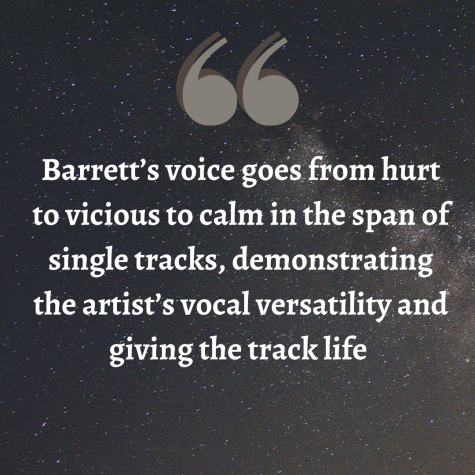‘young forever’ uncovers a plethora of emotions
Nessa Barrett’s debut album sheds a spotlight on mental illness
The “young forever” album cover features Nessa Barrett in angel wings, with an angelic aura surrounding her
October 18, 2022

Delving into self-perception, religion, relationships and mental health, “young forever” by Nessa Barrett introduces a new level of emotional rawness and vulnerability to contemporary pop. Released on Oct. 14 with 13 tracks, the album is an impressive step-up from Barrett’s previous EP “pretty poison” in terms of its production, vocals and musical diversity. From the electric synths in “talk to myself” to the acoustic guitar in “lovebomb” and “young forever,” she merges characteristics from multiple genres of music.
The album begins with “tired of california,” released as a single a week before the album’s official release. Uncovering the emotional distress that fame gives the young artist, the single effectively sets the theme for the remainder of the album. But the most mesmerizing aspect of the track is the youth chorus featured in the song. The group sings the lyrics “Can I be young, forever? / Would it be fun, forever?” in the track’s bridge, with the innocence in their voices introducing a whirlwind of emotion. Through a mixture of background vocals, angsty production, honest lyricism and a pop-rock theme, “tired of california” is a beautiful single and serves as a highly effective introduction for the album.
However, the second track, “gaslight,” takes a different turn and discusses infidelity and insecurities. The production of the track is mellow in comparison to “tired of california,” where Barrett’s eerily calm vocals are instead the track’s defining characteristic. But these themes are interrupted by track three, “talk to myself,” with the track’s intro being an instrumental progression that sets the scene for the remainder of the song. Furthermore, track three reveals a new realm of emotions, choosing to reflect on the singer’s tendency to treat herself harsher than she would allow others to treat her. Following track three, track four “f—kmarrykill” goes on to merge characteristics from both “gaslight” and “talk to myself,” continuing to express the singer’s self-resentment but in a calmer, more heartfelt way.
Although the album’s themes initially appear repetitive, Barrett’s execution of them differs drastically from track to track. Each song’s production emphasizes the emotions it is meant to convey — hence, while songs may cover similar topics, the production and Barrett’s vocals allow every track to stand apart. An example of this can be seen by comparing “talk to myself” and “unnecessary violence,” both of which uncover the treatment Barrett receives from others during her rise to stardom. While “talk to myself” covers the topic in a nonchalant, confident manner, “unnecessary violence” dives into the sadness the internet has put the singer through.
By far the most vulnerable track of the album is track five: “dear god.” With the first verse asking “Dear God, / Do You hear me when I’m crying? When I doubt / That my soul is worth saving? Thinking / ‘I’m not good enough for You to answer, what the f–k?’ / Don’t You love us all the same?” the song uncovers Barrett’s relationship with religion, a theme Barrett has never openly spoken about in her music. The fear in the artist’s voice shines through, alongside the melancholy in her vocals and the production, effectively demonstrating the sheer vulnerability within the song. Additionally, because Barrett’s vocals lead the song while the guitar strums and instrumentals take a backseat, the track feels significantly more personal compared to the other 12 tracks on “young forever.”
Similar energy is continued in tracks such as “forgive the world,” “unnecessary violence” and “lovebomb,” where Barrett’s voice defines the three tracks’ emotions. However, tracks such as “madhouse” utilize rock-heavy production to emphasize the artist’s sense of hostility and other rampant emotions — which, in “madhouse” specifically, refers to the fearful aspects of a mental hospital and the reactions from others after one is discharged.

However, certain aspects of the album feel disingenuous. For example, Barrett’s lyricism in “young forever,” is a let-down from “pretty poison.” While the EP had novelty with its themes of mental illness, breakups and recovery — with each track taking a unique angle on each given concept — many of the tracks in “young forever” merge into a pool of indistinguishability. Hence, despite the production and vocals being stellar, the lyrics disappointingly lack depth, causing the album to sound childish. Thus, in comparison to “pretty poison,” the LP disappointingly falls short in terms of its lyricism.
But the emotions with which Barrett sings these simplistic lyrics more than makes up for their apparent lack of depth. Barrett’s voice goes from hurt to vicious to calm in every track, demonstrating the artist’s vocal versatility and giving the track life — Barrett’s vocals, not her lyricism, is the album’s strongest aspect. In terms of individual tracks, “young forever” hits all the marks — each song is filled with emotions, all conveyed in differing ways, allowing the album to be versatile and fitting for almost every seemingly inexplicable feeling. Hence, although the album’s lyrics could be deeper, the sheer diversity in terms of production, vocals and overall theme characterize “young forever” as stellar in every other regard.
View this post on Instagram
4/5


















